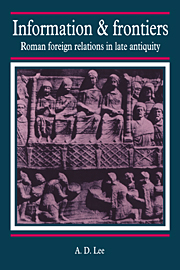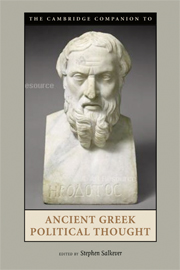Refine search
Actions for selected content:
23990 results in Ancient history

Information and Frontiers
- Roman Foreign Relations in Late Antiquity
-
- Published online:
- 29 September 2009
- Print publication:
- 27 August 1993

The Cambridge Companion to Ancient Greek Political Thought
-
- Published online:
- 28 September 2009
- Print publication:
- 27 April 2009
11 - Virtue and violence: The historians on politics
- from Part III - Subjects
-
-
- Book:
- The Cambridge Companion to the Roman Historians
- Published online:
- 28 November 2010
- Print publication:
- 24 September 2009, pp 181-194
-
- Chapter
- Export citation
10 - Religion in historiography
- from Part III - Subjects
-
-
- Book:
- The Cambridge Companion to the Roman Historians
- Published online:
- 28 November 2010
- Print publication:
- 24 September 2009, pp 166-180
-
- Chapter
- Export citation
Index
-
- Book:
- The Cambridge Companion to the Roman Historians
- Published online:
- 28 November 2010
- Print publication:
- 24 September 2009, pp 455-464
-
- Chapter
- Export citation
17 - Women in Roman historiography
- from Part V - Characters
-
-
- Book:
- The Cambridge Companion to the Roman Historians
- Published online:
- 28 November 2010
- Print publication:
- 24 September 2009, pp 276-287
-
- Chapter
- Export citation
9 - Space
- from Part III - Subjects
-
-
- Book:
- The Cambridge Companion to the Roman Historians
- Published online:
- 28 November 2010
- Print publication:
- 24 September 2009, pp 152-165
-
- Chapter
- Export citation
Introduction
-
-
- Book:
- The Cambridge Companion to the Roman Historians
- Published online:
- 28 November 2010
- Print publication:
- 24 September 2009, pp 1-8
-
- Chapter
- Export citation
13 - The exemplary past in Roman historiography and culture
- from Part IV - Modes
-
-
- Book:
- The Cambridge Companion to the Roman Historians
- Published online:
- 28 November 2010
- Print publication:
- 24 September 2009, pp 214-230
-
- Chapter
- Export citation
Part I - Approaches
-
- Book:
- The Cambridge Companion to the Roman Historians
- Published online:
- 28 November 2010
- Print publication:
- 24 September 2009, pp -
-
- Chapter
- Export citation
21 - The Roman exempla tradition in imperial Greek historiography: The case of Camillus
- from Part IV - Transformations
-
-
- Book:
- The Cambridge Companion to the Roman Historians
- Published online:
- 28 November 2010
- Print publication:
- 24 September 2009, pp 332-347
-
- Chapter
- Export citation
Part IV - Transformations
-
- Book:
- The Cambridge Companion to the Roman Historians
- Published online:
- 28 November 2010
- Print publication:
- 24 September 2009, pp -
-
- Chapter
- Export citation
3 - Historians without history: Against Roman historiography
- from Part I - Approaches
-
-
- Book:
- The Cambridge Companion to the Roman Historians
- Published online:
- 28 November 2010
- Print publication:
- 24 September 2009, pp 41-62
-
- Chapter
- Export citation
25 - The Roman historians and twentieth-century approaches to Roman history
- from Part IV - Transformations
-
-
- Book:
- The Cambridge Companion to the Roman Historians
- Published online:
- 28 November 2010
- Print publication:
- 24 September 2009, pp 394-406
-
- Chapter
- Export citation
1 - Ancient audiences and expectations
- from Part I - Approaches
-
-
- Book:
- The Cambridge Companion to the Roman Historians
- Published online:
- 28 November 2010
- Print publication:
- 24 September 2009, pp 11-23
-
- Chapter
- Export citation
6 - Cato’s Origines: The historian and his enemies
- from Part II - Contexts and Traditions
-
-
- Book:
- The Cambridge Companion to the Roman Historians
- Published online:
- 28 November 2010
- Print publication:
- 24 September 2009, pp 108-122
-
- Chapter
- Export citation
24 - Re-writing history for the early modern stage: Racine’s Roman tragedies
- from Part IV - Transformations
-
-
- Book:
- The Cambridge Companion to the Roman Historians
- Published online:
- 28 November 2010
- Print publication:
- 24 September 2009, pp 380-393
-
- Chapter
- Export citation
22 - Ammianus Marcellinus: Tacitus’ heir and Gibbon’s guide
- from Part IV - Transformations
-
-
- Book:
- The Cambridge Companion to the Roman Historians
- Published online:
- 28 November 2010
- Print publication:
- 24 September 2009, pp 348-361
-
- Chapter
- Export citation
5 - Roman historians and the Greeks: Audiences and models
- from Part II - Contexts and Traditions
-
-
- Book:
- The Cambridge Companion to the Roman Historians
- Published online:
- 28 November 2010
- Print publication:
- 24 September 2009, pp 77-107
-
- Chapter
- Export citation
Chronological list of the historians of Rome
-
- Book:
- The Cambridge Companion to the Roman Historians
- Published online:
- 28 November 2010
- Print publication:
- 24 September 2009, pp 407-417
-
- Chapter
- Export citation
